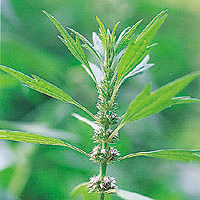
A-Z Indexes Food Health Guides
Health News |
MotherwortFind ProductsAlso indexed as:Leonurus cardiaca  © Martin Wall © Martin WallBotanical names: Leonurus cardiacaHow It WorksThe identities of the active constituents of motherwort are not entirely clear, though they likely include compounds in its volatile oil and the alkaloids. Little research has been done on motherwort in the West. Animal research performed in China suggests that motherwort alkaloids can calm the central nervous system and stimulate the uterus to contract.4 A report suggests that preliminary human trials have found that Chinese motherwort stimulates uterine contraction after delivery and may alleviate glomerulonephritis (kidney disease secondary to infection).5 However, insufficient details were provided to assess the quality or results of these studies. How to Use ItA tea can be prepared by steeping approximately 3/4 teaspoon (4.5 grams) of the cut herb in 1/2–3/4 cups (150 ml) of water.6 Three cups (750 ml) of the tea may be consumed daily. Alternatively, a tincture, 1/2–3/4 teaspoon (2–4 ml) three times per day, can be taken. Copyright © 2026 TraceGains, Inc. All rights reserved. Learn more about TraceGains, the company. The information presented by TraceGains is for informational purposes only. It is based on scientific studies (human, animal, or in vitro), clinical experience, or traditional usage as cited in each article. The results reported may not necessarily occur in all individuals. Self-treatment is not recommended for life-threatening conditions that require medical treatment under a doctor's care. For many of the conditions discussed, treatment with prescription or over the counter medication is also available. Consult your doctor, practitioner, and/or pharmacist for any health problem and before using any supplements or before making any changes in prescribed medications. Information expires December 2026. |
